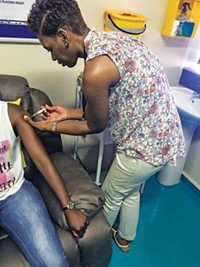Advertisement
Grab your lab coat. Let's get started
Welcome!
Welcome!
Create an account below to get 6 C&EN articles per month, receive newsletters and more - all free.
It seems this is your first time logging in online. Please enter the following information to continue.
As an ACS member you automatically get access to this site. All we need is few more details to create your reading experience.
Not you? Sign in with a different account.
Not you? Sign in with a different account.
ERROR 1
ERROR 1
ERROR 2
ERROR 2
ERROR 2
ERROR 2
ERROR 2
Password and Confirm password must match.
If you have an ACS member number, please enter it here so we can link this account to your membership. (optional)
ERROR 2
ACS values your privacy. By submitting your information, you are gaining access to C&EN and subscribing to our weekly newsletter. We use the information you provide to make your reading experience better, and we will never sell your data to third party members.
Biological Chemistry
A Boost For HIV Vaccine Research
Gates Foundation awards $287 million to global network of 165 researchers
by Sarah Everts
July 21, 2006
HIV vaccine research just got a $287 million boost from the Bill & Melinda Gates Foundation. A global network of 165 scientists from 19 countries will be given the money in the form of 16 grants over five years to develop new vaccine leads and improve upon existing candidates. It's the largest private investment in HIV vaccine research to date. In comparison, the National Institutes of Health has spent $3.9 billion in this area since the 1989.
"I'm really thrilled, as are all our collaborators," says Leo Stamatatos of the Seattle Biomedical Research Institute. He is the lead researcher on a $19.4 million grant that will use computational chemistry to develop mimics of HIV antigens that could elicit the production of antibodies in humans, and hopefully, protection from the virus.
Stamatatos' team will make use of Rosetta, a macromolecular design and prediction program developed by University of Washington biochemist David Baker. Individuals around the world can also contribute to this project by donating their personal computer's idle time to run calculations over the Internet.
"We previously used Rosetta to design proteins with novel structures and are excited now to be designing proteins that could be powerful vaccines," Baker says.
Development of an HIV vaccine, touted by health officials as the best way to control the AIDS epidemic, has been a challenging enterprise. After two decades of research toward an HIV vaccine, only a single vaccine candidate, VaxGen's AIDSVAX, has completed full–scale human testing, but it proved ineffective. During the past four years, the number of vaccine candidates in human clinical trials rose past 30, but the science behind the candidates is similar.
Existing candidates are based on a hypothesis that protection from HIV might be gained by eliciting cell–mediated immune response. If this hypothesis fails, the pipeline of potential vaccines could dry up. The Gates Foundation grants aim to provide funding for a wider variety of vaccine–development strategies. For example, researchers will try to make broadly neutralizing antibodies, since variability on the virus' exterior makes it extremely difficult to create a vaccine that provides protection against all HIV strains.
In addition to searching for new vaccine leads, some of the funded projects aim to improve upon existing candidates. David Ho at Aaron Diamond AIDS Research Center in Manhattan and colleagues will spend $24.7 million looking for ways to present carefully selected HIV peptide fragments to immune system cells to stimulate protection. The group will also study how to use glycolipids to improve the immune response, Ho says. "These compounds show great potential."
In the past, HIV vaccine research has been pursued by independent teams working in relative isolation. The Gates funding aims to foster collaboration among the teams involved in the initiative by providing software that allows sharing of results in real time.
"The spirit of the HIV vaccine enterprise is openness and collaboration. All the experiments that groups will be conducting will be open to everyone," Stamatatos says. "The money will let us test a lot of different antigens, allow us to test them rapidly, and let us really be able to compare and get information about what everyone else is finding."






Join the conversation
Contact the reporter
Submit a Letter to the Editor for publication
Engage with us on Twitter